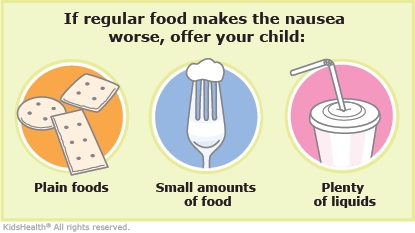Nausea: How to Care for Your Child
Nausea is a feeling of being sick to the stomach. Children of any age can have nausea. It often happens before throwing up. It's rarely serious and usually goes away in a few days.


-
Only give medicine if your health care provider recommended it.
-
Try to give your child a balanced diet if possible, but don't force your child to eat.
-
If your child's regular food makes the nausea worse, encourage your child to:
-
Eat plain foods, such as toast, crackers, rice, and mashed potatoes.
-
Avoid greasy, fried, or sugary foods.
-
Eat and drink small amounts slowly.
-
Avoid activity right after meals.
-
Encourage your child to get plenty of liquids:
-
Offer things like water, diluted juice, soup, ice pops, or gelatin.
-
Avoid carbonated drinks (like soda) and drinks with caffeine (like coffee and caffeinated teas).
-
Follow your health care provider's advice about when your child can return to school or childcare.

Your child:
-
starts vomiting
-
has nausea that lasts for more than a week or comes back again after getting better
-
has belly pain or watery diarrhea
-
has a fever
-
has headaches that are severe or frequent or happen in the morning when they wake up
-
refuses to eat or drink

Why does nausea happen? Common reasons for nausea include infections, stress, anxiety, some medicines, motion sickness, food sensitivities, allergic reactions, pregnancy, and dehydration.